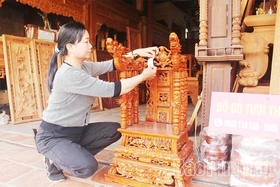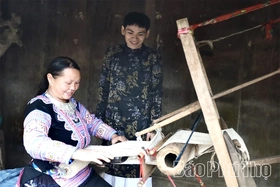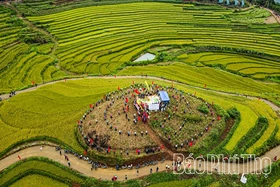{title}
{publish}
{head}
The project to merge the three provinces of Phu Tho, Vinh Phuc, and Hoa Binh into a new Phu Tho province places high demands on solidarity and the preservation of regional cultural identities. The effort to preserve and promote the Muong ethnic culture has become even more urgent after the merger, as in the former Hoa Binh province alone, the Muong ethnic group accounted for over 63% of the population. This is not only a matter of cultural identity but also a core factor for Phu Tho to develop sustainably and affirm its position within a new, expanded administrative framework.

The traditional costumes of the Muong ethnic group are showcased during events, helping preserve and promote cultural values in contemporary life.
Muong culture - A living asset in the mountains
The Muong people of Hoa Binh have long nurtured a rich treasure trove of cultural heritage, ranging from Mo Muong chants and gong culture to the De Dat and De Nuoc epics, traditional festivals, folk knowledge, handicrafts, stilt houses, costumes, and cuisine. Among these, Mo Muong and Muong gong art have been recognized as national intangible cultural heritage and are being prepared for submission to UNESCO for recognition as world cultural heritage.
However, in the context of rapid urbanization, globalization, and the impact of modern life, many of these cultural values are at risk of fading away. Fewer than 10% of traditional stilt houses remain. The Muong language, traditional scripts, attire, and folk games are also disappearing from everyday life. Even more concerning is that younger generations show diminishing interest in the Muong language and rarely speak their mother tongue.
In November 2023, the People’s Committee of Hoa Binh province issued the project “Preserving and Promoting the Cultural Values of the Muong Ethnic Group and Hoa Binh Culture for the 2023–2030 Period,” demonstrating a strong political commitment to safeguarding traditional cultural values amid change. The project includes building a Muong ethnic cultural space in Tan Lac district, envisioned as a “Muong cultural capital,” with performance areas, the organization of the Khai Ha Festival, restoration of ancient villages, and development of community-based tourism. Additionally, it involves restoring and enhancing heritage sites such as Hang Xom Trai (Tan Lap commune) and Mai Da Lang Vanh (Yen Phu commune, Lac Son district) and preparing a dossier to submit to UNESCO for world heritage recognition.
The system of traditional festivals held by the four major Muong regions of the province, such as Muong Bi, Muong Thang, and Muong Dong, is gradually being restored at the provincial level, forming a foundation for unique cultural tourism products. In 2022, the Muong Khai Ha Festival was included in the National Intangible Cultural Heritage List. From 2023 to 2025, this festival is held annually at the provincial level, providing opportunities to further promote the image of the Muong people of Hoa Binh to both domestic and international audiences.
At the 2025 Khai Ha Festival, Ms. Le Thi Ngoc Mai, a tourist from Hanoi, shared her impression: “I was very moved by the Muong cultural space at the Khai Ha Festival. From the resonating gong sounds and traditional dances to the ethnic cuisine, everything evokes a special emotional connection. This isn’t just a sightseeing trip but a journey to truly experience and understand the depth of Muong culture.”
Of special note, in 2016, Hoa Binh province completed and officially adopted a writing system for the Muong language, a historic milestone for the preservation of ethnic culture. According to folklore researcher Bui Huy Vong, the establishment of the Muong writing system plays a vital role in preserving Mo Muong, as only through writing can these chants be recorded completely and accurately. These texts are now being translated into English and other languages to serve as scientific documentation. The Muong language also ensures the continuity of ethnic culture through folk songs, antiphonal singing, and other forms of oral tradition such as Thuong Rang and Bo Meng.

The Khai Ha Festival of the Muong ethnic group is held annually to introduce cultural identity to domestic and international tourists.
Nurturing dentity
As someone who has long listened to the concerns of voters and residents of the former Hoa Binh province, Mr. Bui Van Luyen, Vice Chairman of the Fatherland Front Committee of Phu Tho province, expressed, “Voters hope that after the merger, Muong ethnic culture will continue to be preserved and valued. Sustainable development is impossible if identity is lost. Culture must not be a mere display, it must live and breathe within the community. Identity is a form of soft power, an internal strength of the province, and Muong culture is an indispensable part of that.”
The merger is not just a matter of administrative restructuring but also raises questions about how to position regional identity without letting it dissolve in the larger cultural mosaic. For Hoa Binh, Muong culture plays a central role. Preserving this culture is not merely about heritage, it is about preserving a distinct “self,” forming the foundation that contributes to the shared identity of the new province.
From restoring festivals and stilt houses to reviving brocade weaving, organizing Muong language classes, improving support policies for artisans, and linking cultural preservation with tourism development, every step must be part of a long-term strategy. Culture must be embedded in daily life, not confined to museums. Artisans who are keepers of Mo Muong heritage need to be properly honored and supported as teachers. Each Muong language class helps younger generations connect with their roots, forming a vital thread in the cultural continuum.
In the coming period, Phu Tho province is committed to mobilizing broad participation across the political system and the community. This includes integrating cultural preservation into socio-economic development plans, socializing heritage conservation resources, promoting the value of Muong culture, and encouraging communities to create unique cultural and tourism products. In doing so, cultural heritage becomes a real asset that contributes to improving local livelihoods.
Culture is the thread connecting the past, present, and future. Within the new administrative space, Muong culture provides a foundation for harmony and sustainable development. Preserving the roots and nurturing cultural identity are the ways through which the values of the Muong people will not only integrate but also shine.
Huong Lan

baophutho.vn On December 8, 2017, at its 12th session, the UNESCO Intergovernmental Committee for the Safeguarding of Intangible Cultural Heritage...

baophutho.vn Situated in the fertile land of Binh Nguyen (Vinh Phuc), the Huong Canh Communal House Complex — comprising Huong Canh, Ngoc Canh and Tien...

baophutho.vn For generations, whenever people mention Huong Canh Town (former Binh Xuyen District, Vinh Phuc Province), now Binh Nguyen Commune of Phu Tho...

baophutho.vn Kha Cuu Commune was formed by merging three former communes: Dong Cuu, Thuong Cuu, and Kha Cuu, with the Muong ethnic group accounting for over...

baophutho.vn Perched atop Tram Linh Hill, Quoc Te Temple in the former Di Nau Commune — now Tho Van Commune — has long been regarded as a solemn and...

baophutho.vn Located in Giap Lai Commune, this ancient communal house is revered by local residents as the “soul of the Muong village.” It is dedicated to...

baophutho.vn The Thai people are the largest indigenous ethnic group in Mai Chau District, now residing mainly in communes such as Mai Chau, Bao La, Mai Ha,...

baophutho.vn Today, Phu Tho Province is home to hundreds of traditional craft villages — from wood carving, blacksmithing, and bamboo weaving to mechanics,...

baophutho.vn In line with the orientation toward tourism-based economic development, the traditional brocade weaving craft of the Mong ethnic group in Pa Co...

baophutho.vn On the morning of October 25, the opening ceremony of the Mien Doi Terraced Fields Festival 2025 took place in Thuong Coc Commune.